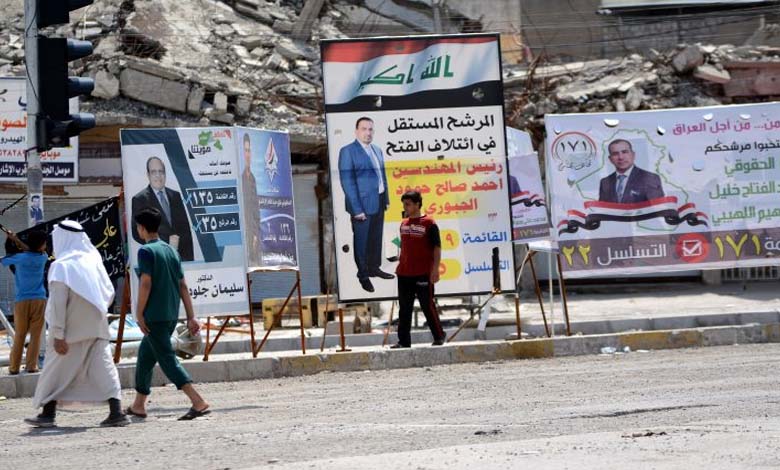Iraqi ruling parties’ influence greater than electoral commission’s restrictions

Most election campaigns started early and have involved political financing, in clear violation of electoral campaign regulations.
With the local council election campaigns approaching, the Iraqi Electoral Commission has called on candidates to avoid a set of prohibitions during their election campaigns, subject to penalties and fines. However, the application of these regulations seems difficult, given the limited authority of the law over the ruling parties.
The Independent High Electoral Commission set early November as the date for launching election campaigns for provincial council candidates, along with a number of instructions and regulations regarding the electoral campaign system. Legal experts confirmed that the penalties include fines, imprisonment, and even disqualification for those who violate the regulations and terms of the new Electoral Law No. 4 for the year 2023.
Most election candidates and their parties have started their advertising campaigns early by touring underserved residential areas and making promises to residents about services, improving living standards, and government appointments for their children. Most of these campaigns involve political financing, in explicit violation of electoral campaign regulations.
Jumana Al-Ghalay, a spokesperson for the Electoral Commission, said that the Board of Commissioners approved the instructions for election campaign expenditures. For individual candidates, it’s set at 250 dinars (about $0.19) multiplied by the number of voters. For parties and alliances, it’s 250 dinars multiplied by the number of voters times the number of candidates.
As for the election campaign system, which was approved by the Board of Commissioners under No. 2, the Electoral Commission issued a number of regulations in accordance with the electoral law. These include a ban on publishing any advertisements, programs, or images of political parties and alliances in polling stations and polling stations. Campaigning and pasting campaign advertisements for political parties, alliances, and candidates within 100 meters of polling stations are also prohibited.
Political parties, alliances, and candidates are prohibited from exploiting or using any of the election campaign means provided by the Electoral Commission. Candidates and parties are not allowed to distribute work programs, publications, cards, or other documents by themselves or through others on voting day.
Legal experts believe that political financing in election campaigns cannot be addressed by threats and warnings alone but needs decisive measures and sanctions that extend to violators, as well as a mechanism for enforcing penalties. The dominance of ruling parties is clearly visible through the exploitation of public funds and the use of government departments to pave roads and streets and other practices that occur in every election campaign.
Despite the fact that the Electoral Commission prohibits the use of government buildings, various state institutions, and places of worship for any advertising or election activities for candidates, parties, and alliances, it is forbidden to use the official state emblem in meetings, advertisements, electoral publications, writings, and drawings used in the election campaign.
Al-Ghalay confirmed the prohibition of spending on election campaigns from public funds, ministry budgets, religious endowments, or external support, and the use of any form of pressure or coercion is not allowed, nor is giving material or moral benefits or promising them in order to influence voters and election results.
In order to monitor the progress of election campaigns, the Electoral Commission has set up central and subcommittees to coordinate with municipal councils and the Baghdad Governorate, as well as to coordinate with the Communications Authority regarding monitoring and following up on election campaigns on social media platforms.
Legal expert Ali At-Tamimi stated that these articles introduced physical penalties and fines ranging from imprisonment for up to one year and fines of up to 50 million dinars as a maximum for individuals and even entities, and it may even include disqualification by the Board of Commissioners.
At-Tamimi emphasized in statements to local media that “the Commission is required to prevent sectarian polarization and exclude any entity or person promoting it so as not to affect the upcoming election date”. He added that “these penalties, especially the fines, need to be activated in order to control the campaign and achieve the objectives of criminal punishment, which is deterrence and achieving social justice”.
The local elections in Iraq are scheduled for December 18th and will be the first local elections in the country since April 2013. Elected provincial councils will have the responsibility to select the governor and executive officials of the province, and they have the authority to appoint and dismiss and approve project plans according to the budget allocated to the province from the central government in Baghdad, according to the constitution.
According to the data of the Iraqi Electoral Commission, more than 23 million citizens are eligible to vote in the local council elections, including over 10 million people who have updated their voter records so far.
The Commission stated that 296 political parties organized themselves into 50 alliances that will participate in the elections. Candidates will compete for 275 seats, which are the total seats of the provincial councils in general, and 75 of them are designated for women and 10 seats for ethnic and religious minorities.












